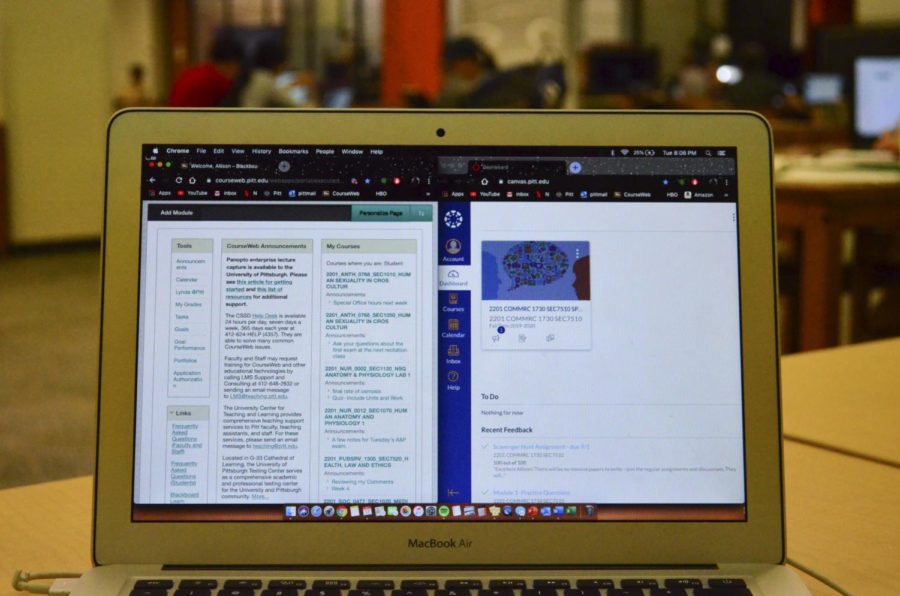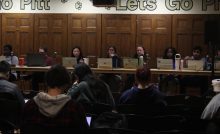‘Resilient and committed’: First week of online classes proceeds without issue


The first week of online classes at the University proceeded with no major issues, according to students and faculty.
The biggest technological issue Marcie Persyn encountered this week was her cat attempting to walk on her keyboard in the middle of a Zoom lecture.
Pitt faculty had limited time to move all in-person classes online and restrict access to University facilities in the midst of the COVID-19 pandemic, but the first week of online classes at the University proceeded with no major issues. Most of the complications faculty encountered involved learning to teach on new platforms and developing different teaching strategies for individual classes.
Marcie Persyn, who teaches Beginning Latin 2, Intermediate Greek and Mythology in the Ancient World, said she had some worries about the shift to online learning, but the week ultimately went smoothly. Persyn said one of her remaining concerns was finding alternatives for outside-the-classroom activities she had planned.
“I am most disappointed that my myth class won’t get to visit the Carnegie Museum as a group,” Persyn said. “But on the bright side, there are an abundance of virtual alternatives like touring the British Museum online.”
Persyn added that she is also worried about students who may not have access to fast or consistent Internet.
“We are all doing the best we can to stay in touch, keep everything transparent, and maintain fairness for our students in this time of flux,” Persyn said. “We want to ensure that no one gets left behind after this online transition.”
Katie Carr, a sophomore public and professional writing major, said her first week of online class has been more laid-back than her usual classes. She added that while this has made the transition less stressful, it has been difficult to adjust to not having a strict schedule.
“None of my classes meet on Zoom, so I don’t even have a scheduled time for each class anymore,” Carr said. “I’m not sure if that’s a good thing yet.”
Similar to Persyn, Kiersten Maryott, an assistant professor of business administration, also explained some of the difficulties she encountered while moving courses online. Maryott teaches two sections of Introduction to Marketing as well as Services Marketing, a smaller, upper-level elective.
“There are plenty of problems encountered when trying to quickly convert a course to an online format, specifically when needing to practice social distancing — how to give exams, how to get students to participate in discussions and how to adjust an assignment that requires students to spend time shadowing a person on their job,” Maryott said.
Maryott said one of the biggest things she has to contend with, in addition to logistical issues, is the loss of in-person interactions with her students. She said she hopes students will become more comfortable turning their videos on during Zoom lectures over the next few weeks.
“In one of my classes, after I invited them to turn on their videos, some of the students actually did, and it really helped,” Maryott said. “At least then I felt like I was talking with my students rather than simply names on the screen.”
Maryott added that she is trying to provide her students with the comprehensive education they’re paying for, while not adding any unnecessary stress to their lives.
“My focus is on trying to provide some semblance of normalcy in these uncertain times,” Maryott said, “while also recognizing that the students likely have a whole host of other issues they are dealing with.”
Cynthia Golden, the associate vice provost and executive director of the University Center for Teaching and Learning, said the Center is one place instructors can reach out to if they encounter problems while teaching online classes. She said the Center aims to provide help concerning both teaching approaches and technological issues.
“We knew some faculty would need our assistance not only with how to use some of the educational technologies that would allow remote teaching and learning,” Golden said, “but also they would need our help to think about the teaching strategies they would use to move their face-to-face classrooms to remote learning.”
Golden added that along with virtual office hours and technology workshops, the Center runs a website that lists strategies professors can use to connect with students. The Center also provides answers to many common questions that may arise in the shift to virtual learning.
“This certainly isn’t what anyone expected at the start of the spring term,” Golden said. “But what I’m seeing are faculty who are resilient and committed to their students’ education, and students who will work to make the best of a tough situation.”
Recent Posts
Opinion | Final thoughts.
Senior staff columnist Emily O’Neil discusses her final experiences at college and how the time…
Opinion | Goodbye, Pitt
In this column, staff writer Jake Vasilias reflects on his time at Pitt.
Opinion | How to have a resisting-fascism summer
Contributing editor Emma Hannan talks about ways you can stay politically active while not in…
Who Asked? // What comes next?
This installment of Who Asked? by senior staff writer Brynn Murawski faces an uncertain future.
A Good Hill to Die On // Goodbye
In the final edition of “A Good Hill to Die On,” I decided to rant.
Review | Delayed checkouts at ‘The White Lotus’: An unoriginal third season
(Contains Spoilers) There is no meditation class, no reiki session, no nutritionally balanced, organic food…

